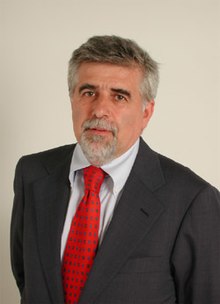Giulio Santagata
Giulio Santagata | |
|---|---|
 | |
| Minister for the Implementation of the Government Program | |
| In office 17 May 2006 – 8 May 2008 | |
| Prime Minister | Romano Prodi |
| Succeeded by | Gianfranco Rotondi |
| Member of the Chamber of Deputies | |
| In office 30 May 2001 – 14 May 2013 | |
| Constituency | Emilia-Romagna (2001–06) Lazio 1 (2006–08) Campania 1 (2008–13) |
| Personal details | |
| Born | 1 October 1949 Zocca, Italy |
| Political party | The Daisy (2002–07) Democratic Party (2007–17) Civic Area (2017–present) |
Giulio Santagata (born 1 October 1949) is an Italian politician, former member of the Italian Chamber of Deputies and leader of Together.[1]
Biography[]
Giulio Santagata was born in Zocca, near Modena, in 1949. He graduated in Economy and Commerce at the University of Bologna; then he started working for the region Emilia-Romagna, but after few years he abandoned this job to become a tax advisor.
In 1996 he was appointed economic councilor by Prime Minister Romano Prodi; when Prodi became President of the European Commission in 1999, Santagata followed him in Brussels. In 2001 Santagata was elected in the Italian Chamber of Deputies.[2]
In 2006 Santaagata was the main coordinator of Prodi's electoral campaign for the general election, which Prodi narrowly won against the centre-right led by Silvio Berlusconi.
During 2017 there were lengthy talks on the creation of an electoral list to the left of the Democratic Party (PD), within the PD-led centre-left coalition. In this process Giuliano Pisapia, a former mayor of Milan, launched the Progressive Camp (CP) and long pondered the possibility of leading the proposed list, including minor established parties, assorted leftists and, most notably, former members of Left Ecology Freedom (SEL) – which had been folded into the more radical Italian Left (SI).
In December, after Pisapia's retirement and the dissolution of the CP, Santagata founded Civic Area, a progressive party mainly composed of former Olivists, a faction of Prodi's loyalists within Democracy is Freedom and, subsequently, the Democratic Party.[3] After few days, along with Riccardo Nencini (leader of the Italian Socialist Party, Angelo Bonelli (leader of the Federation of the Greens), he launched Together in order to participate in the 2018 general election as a part of the centre-left coalition, along with More Europe (+Eu) and the Popular Civic List (CP). Together's logo was styled on that of The Olive Tree, a broad centre-left coalition active from 1995 to 2007 (when its main components were merged into the PD).[4][5][6]
References[]
- ^ Noi prodiani Insieme al Pd. Giulio Santagata spiega come
- ^ Giulio Santagata – Camera dei Deputati
- ^ Nasce la lista Insieme Italia Europa
- ^ Ecco “Insieme”, la lista ulivista alleata del Pd
- ^ “Insieme”, Psi con Verdi e prodiani alleati di Renzi: “Non siamo civette o mosche cocchiere”. E c’è chi azzarda: “7-8%”
- ^ Ritorna, in piccolo, L'Ulivo e l'avversario è sempre lo stesso: "Siamo gli unici che hanno battuto due volte Berlusconi"
- 1949 births
- Living people
- Politicians from the Province of Modena
- Democracy is Freedom – The Daisy politicians
- Democratic Party (Italy) politicians
- Government ministers of Italy
- Deputies of Legislature XIV of Italy
- Deputies of Legislature XV of Italy
- Deputies of Legislature XVI of Italy